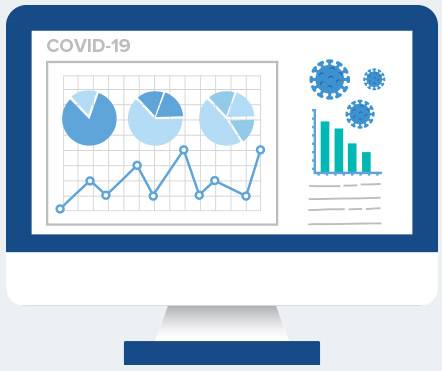In a landscape indelibly altered by the COVID-19 crisis, we’ve been forced to rethink how we can safely gather to educate, learn, and connect. As a result, a number of in-person conference events have restructured to an online format and many are joining the trend every day. Before you panic, this isn’t inherently bad news. There are many benefits to be gleaned from participating in a virtual healthcare conference, as long as you know how to get the most out of the opportunity.
Virtual conferences should hold considerable appeal for busy practitioners. Even before the pandemic, barriers such as work schedules, travel time, and personal commitments have kept providers from being able to attend in-person conferences. Add hotel accommodations, travel and food costs, plus the cost of registration, and the prospect becomes even less achievable. As more of these meetings become available online, the subsequent convenience, accessibility, and cost-friendliness of a virtual healthcare conference make involvement much more feasible.
Virtual Healthcare conferences slated for fall 2020:
- MGMA Medical Practice Excellence Conference
The Medical Group Management Association (MGMA) is hosting its Medical Practice Excellence Conference to provide learning opportunities for medical professionals. This virtual even was designed to intentionally, and continuously, develop attendee leadership skills. Convene to learn how healthcare leaders like you are responding to the bigger challenges in these unprecedented times. It’s time to seize the opportunity to build and sustain excellence. - (IHI’s) Primary Care Summit 2020
The Institute for Healthcare Improvement (IHI) Primary Care Summit is great for health care professionals who are committed to transforming primary care. This virtual conference will combine practical instruction with rejuvenating inspiration, equipping attendees to achieve better outcomes for the people and populations they serve during these unprecedented times. - Adult Medicine Livestream
Keep up-to-date and immediately implement skills and recommendations from this evidence-based, family medicine-specific CME course from the American Academy of Family Physicians (AAFP). - Lifestyle Medicine: Health Restored
The American College of Lifestyle Medicine (ACLM) will host a CME accredited conference featuring prominent keynote speakers, an impressive line-up of presenters recognized as the foremost experts in the field, and networking opportunities with like-minded medical professionals and industry leaders. - Rock Health Summit
This two-day digital health conference brings together diverse minds from technology, medicine, policy, and beyond for the most inspired and informed conversations in healthcare.
If you’ve never taken part in a virtual healthcare meetup, you may have questions. What is it like to participate in a virtual conference? What can you do to get the most out of your experience? Keep reading to find out.
How a Virtual Conference Works
A virtual conference is an online presentation of an in-person event. Most often, an online conference produces content in a format like a webinar, but with a blend of keynote speakers, discussion panels and workshops just like you’d experience in a live conference. In the past, a majority of online conferences have been reserved for those in the technology space or for professionals who own online businesses. But in a pandemic, industries across the board are realizing the value of hosting in-person conferences on a virtual platform. At this time, there is no telling if virtual conferences will stick around after the public health crisis is over. Regardless, a virtual conference operates under the same basic principles as an in-person conference: register and pay to attend, join the digital meeting space on time, and be ready to learn.
Commit to the Conference
Once you’ve registered for your virtual healthcare meetup, set a reminder so you won’t forget. Since you won’t be traveling, a virtual conference can sneak up on you. Set a reminder a few days before the event so you have ample time to clear your schedule and prepare. Alerts also help you make sure that your attendance is front-of-mind as the meeting date approaches.
Make Time in Your Schedule
As mentioned earlier, time is a legitimate barrier many practitioners face when it comes to attending healthcare conferences. It can feel overwhelmingly impossible to clear precious time, to set aside daily tasks, take time away from patients and staff in order to focus on your own development and education. Virtual healthcare conferences alleviate some of this stress because they are easier to attend and it’s faster to get back to business when the event closes.
Keep in mind that virtual conferences can run just as long as in-person meetings, so time still needs to be carved out. Don’t cheapen your experience, dedicate the conference time to event-only activities to ensure your experience is as immersive as possible.
Keep in mind that virtual conferences can run just as long as in-person meetings, so time still needs to be carved out. Don’t cheapen your experience, dedicate the conference time to event-only activities to ensure your experience is as immersive as possible. If you’re looking to free up some of your and your staff’s time, so you can participate in more career-driving opportunities, consider professional support services to help with the day-to-day monotonous front and back-office tasks. Practitioners who outsource medical billing support or practice management to administrative experts benefit from the assistance of proven professionals and gain more time to focus on what matters most.
Limit Distractions
Staying focused during a virtual conference means reducing distractions as much as possible. If you’re attending the conference from the office, notify staff that you mustn’t be interrupted for the duration of the session. If you’re at home, find a quiet space and let the household know that you’ll be unavailable. Turning off phone notifications and enabling the auto-respond feature for emails also ensures that you eliminate as many digital disruptions as possible.
Take Detailed Notes
You may find yourself at the computer absorbing information for hours at a time. Depending on the conference, this data dump may repeat itself over the course of many days. One way to get the most out of what you’ve learned is to take detailed notes. Supporting your mind by reviewing and reflecting on what you’ve just heard can help you retain and understand the information that’s been presented. Once the conference is over, it can be easy to get pulled back into the busy everyday work of running your practice. Taking detailed notes is an effective way to harness the momentum you’ve built during the virtual experience and a great way to make sure you keep applying your newly gained knowledge long after the session ends.
Network and Engage
Virtual healthcare conferences frequently offer opportunities that support digital networking. After all, an online conference without networking and engagement is just a webinar. Online conferences mean you can ‘talk’ during the session, so be sure to utilize live chat tools to connect with other attendees and interact with the presenter.
Be sure to utilize live chat tools to connect with other attendees and interact with the presenter.
Social media can also serve as an important component in meeting and learning from other attendees. Searching for conference hashtags on Twitter, for example, can help you locate fellow attendees before, during, and after portions of the conference. Additionally, the conference may create a private social media group specifically for attendees to get acquainted and share their ideas. Review your conference confirmation details to find out if there’s a private group for your next event so you can get involved in the discussions.
Similarly, you could publicly share the highlights of what you’ve learned to help others get the most out of your experience. Just like you would chat about a session at an in-person conference, you can do so on social media during a virtual one.
In fact, as a means of boosting engagement, virtual meeting holders are encouraged to host virtual games, break-out sessions and cocktail parties. Some will go as far as sending attendees resources ahead of time so they can participate in these fun ice breakers.
Choosing the Right Meet-Up
With many virtual meetings expected to take place in the coming weeks, it’s important to do the research, plan ahead, and choose a conference worth your time. You can save yourself from becoming overwhelmed by options by narrowing down which meetings you want to attend. Filter by specialty or field of study. If a virtual conference isn’t planned for your specialty yet, try attending a meeting that will expand a specific skill set or address an ongoing concern within your scope of practice.
Final Thoughts
In the days ahead, virtual healthcare meetups will become more and more commonplace as we enter the fall conference season. While social distancing is currently a leading concern, the wealth of possibility for online-based education means virtual conferencing could change how healthcare discussions are conducted even outside the COVID-19 lens. Virtual conferences provide convenience, ease, and accessibility. Participation in high-level career or specialty focused meetings should be of high priority for any growing practice or physician.




